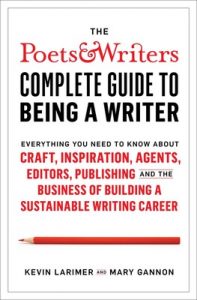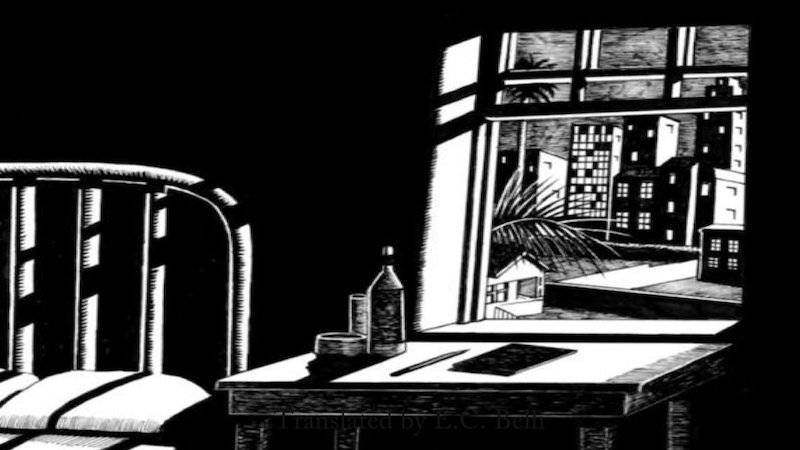How Having a Writing Community Stimulates Creativity
Mary Gannon and Kevin Larimer on Finding Your People
Whether it’s found in crowded rooms or email folders, Twitter threads or Facebook group chats, community is as deeply necessary to a writer as reading. It is a source of assistance, understanding, and camaraderie. It is an exchange of ideas, a wellspring of inspiration, and sometimes, quite literally, a lifeline. But community is also give-and-take; it’s collaborative, mutual, organic. This idea of community—and the notion of being a good literary citizen within that community—is tossed around so often that we can lose track of exactly what we mean when we use those words. So let’s take a moment.
For most of us, two opposing forces are exerting pressure within our minds as writers. Not quite seismic in strength, they nevertheless result in a paradox that each of us must resolve in our own way. We can all agree that in order to write, one must work, at least the majority of the time, in relative solitude. Editing, revising, and publishing are collaborative, no doubt, and even some kinds of writing (such as the exquisite corpse, in which a poem or story is collectively assembled) are accomplished with others, but for the most part it’s you, and you alone, using the tools of your trade: your intellect and your emotions, your eyes and your fingers. You might be writing by candlelight in a remote cabin somewhere in the Adirondacks, or behind the closed door of your pantry turned office in the middle of the night, or on the couch while the baby takes her afternoon nap.
Even if you’re writing in a crowded Starbucks, finishing the fourth tercet of your villanelle while the barista yells out the name of the person whose Triple Venti Half Sweet Non-Fat Caramel Macchiato is ready, you’re still acquiescing to the seclusion your writing requires, albeit in a very modern setting: At its core, this is between you and the words on the page or the screen, no one else, at least in the first stages of drafting a piece of writing. And of course there is something very, very exciting about that: You are the author of that world.
Writing is a solitary act, but as writers, as creative people, we also crave feedback, we want company (as long as it comes at the right time), we want validation, and we want to feel like we’re not alone in our compulsions. It is our very solitude that fuels our desire for solidarity, for community. At some point in your life, you first felt the excitement—mixed with the relief—of realizing that you were talking to someone who understands a little something about your life as a writer, with all of its demands, routines, superstitions, eccentricities, confusions, and wonders. Isn’t that a tremendous feeling? Maybe not as great as the realization or confirmation that you’ve just written a truly great poem, or the thrill of typing the final period of your novel, but still worth chasing.
First, it’s helpful to attempt a deeper understanding of why community is important to us.
One could say that by virtue of being a writer you are automatically a member of the community of writers in this country. But this loose affiliation, awesome in a Six Degrees of Kevin Bacon sort of way, is pretty limited. If you’ve ever felt like a stranger walking the aisles of a huge bookfair—like the annual one organized by the Association of Writers & Writing Programs, held in a different city each year and typically attended by more than ten thousand people—you know that it can be exciting, but perhaps not as personally rewarding as we need it to be. (Are we the only ones who feel a little anxious walking into a massive crowd of people who comprise our “community” at its most general level?)
Still, it is important to recognize our community on that scale for two reasons. It affirms our commitment to writing (See, I’m not crazy, look at all these other fools blindly pursuing a dream that rarely pays dividends!) and it shows us the size and strength of the infrastructure that exists to support writers: how many resources, activities, and energies are devoted to writing and the various industries that have grown up to celebrate, support, and capitalize on it.
Whether it’s a huge industry event or a more intimate gathering of friendly writers, community is a feeling that you are among your people.Just by virtue of being a published author one can join the Authors Guild, “a professional organization dedicated to supporting and protecting the writing life for all working and aspiring authors.” There is certainly a degree of validation—perhaps a sense that you’ve “arrived,” not to mention benefits such as contract reviews and legal advice—that comes from being a card-carrying member of such an organization; the Authors Guild represents community in a broad sense of the term. As does a subscription to a trade magazine or literary journal. It feels like you’re participating in—and caring about and supporting—a shared project of literary expression. It would be difficult to overestimate the power and importance of such a feeling. If you’re surrounded by family members who don’t read books for personal enjoyment, or who don’t value “clarity of thought and feeling,” as Tracy Kidder and Richard Todd put it, you know how important it is to get that magazine in the mail every two months, or to visit the website that’s devoted to the work of writers just like you, who hold it as one of life’s principal values.
But these days, when so much of our “social activity” is accomplished by tapping a heart or a thumbs-up icon (which is not to say that plenty of writers aren’t able to cultivate meaningful followings on social media, where real expressions of emotion, reasoned opinions, and constructive criticism are possible, if not common), writers are more hungry than ever for in-person interactions and a sense of community that is marked by an actual conversation or collaboration and is punctuated by a handshake or even—come on, let’s admit it, we all need one once in a while—a hug.
Whether it’s a huge industry event or a more intimate gathering of friendly writers, community is a feeling that you are among your people. Maybe it’s a group of literary essayists who grew up in the same relatively underserved area of Oklahoma talking about the geography of memory, or it’s fiction writers in Alaska who want to address the issue of climate change through their work, or it’s essayists who gather to discuss markets for their writing, or poets who meet to talk about prison writing and the language of incarceration. Or it’s an open mic held in the back room of a hotel bar every other Tuesday evening. Or a writing group that shares work online every week and meets in person every month for a submission party. From community you can get a sense of belonging, but you can also clarify your sense of self. You can get motivation from community, accountability, support. You can feel recognized, and you can feel a part of something larger than yourself.
Community is also an important part of the creative process because it stimulates us and our thinking, sometimes pushing us further and deeper into our projects. In his book Where Good Ideas Come From: The Natural History of Innovation, Steven Johnson explains how everything that happens in your brain is, technically speaking, a network, and that good ideas have signature patterns in the networks that make them:
“To make your mind more innovative, you have to place it inside environments that share that same network signature: networks of ideas or people that mimic the neural networks of a mind exploring the boundaries of the adjacent possible. Certain environments enhance the brain’s natural capacity to make new links of association.”
We would argue that a healthy, stimulating community is the perfect example of an environment that promotes creative thinking. Like an organic, flesh-and-blood version of the commonplace book, a community allows for connections among writers and their ideas and observations. To say nothing of the emotional support, educational exploration, and camaraderie that community can provide.
Community means different things to different people, but for everyone it’s a vital source of some key ingredients of the writing life.For some writers, that feeling of validation, of support and community, can fill a void created by generations of marginalization, by institutional racism and the failure of social, political, and literary institutions to acknowledge and extend their missions and services to underserved communities. In recent decades there have been a number of literary organizations that have been formed with the express goal or mission of providing support and a sense of community for specific, historically underrepresented groups of writers such as African American poets (Cave Canem), Asian American writers (Kundiman and the Asian American Writers’ Workshop), Latinx writers (CantoMundo), Arab American writers (Radius of Arab American Writers, or RAWI), queer writers (Lambda Literary Foundation), and disabled writers (Zoeglossia). These organizations and many more like them—see the list of 15 National Organizations Serving Writers and Writing at the back of this book—host readings and organize retreats, sponsor literary prizes, maintain websites that offer valuable information, and/or offer other literary activities that can be life-changing.
Poet and attorney Reginald Dwayne Betts saw the retreat sponsored by Cave Canem, a nonprofit organization founded in 1996 “to remedy the under-representation and isolation of African American poets in the literary landscape,” as a kind of home. “Cave Canem opened up the space to think about who I was, and for me that meant it gave me permission to chase the thing that might make me weep. And what is writing, if not this?” he writes. The retreats organized by Kundiman, a nonprofit founded in 2004 to provide “a safe yet rigorous space where Asian American poets can explore, through art, the unique challenges that face the new and ever changing diaspora,” fostered a similar feeling of belonging in Duy Doan, winner of the Yale Series of Younger Poets prize for We Play a Game. “I would never be able to overemphasize the positive impact that the Kundiman retreats have had on me—writing, musing, connecting with other Asian–Pacific Islander American writers, being taken in by a richly talented and generous community,” he writes.
The point is, community means different things to different people, but for everyone it’s a vital source of some key ingredients of the writing life. It’s easy enough to say that writing is all about placing yourself in a chair and grinding it out, you and the words, applying pressure to the rock until diamonds appear in the dust. Solitary seduction, suffering, and success. And it is that—until it isn’t. Then there is a need to share, commiserate, question, discover, inspire, and be inspired with others. When you find the right people, it’s a beautiful, necessary miracle: Your world opens up, the universe expands, and guess what? You’re no longer alone.
__________________________________

From The Poets & Writers Complete Guide to Being a Writer by Kevin Larimer and Mary Gannon. Copyright © April 7th, 2020. Reprinted by permission of Avid Reader Press, an imprint of Simon & Schuster, Inc.




















